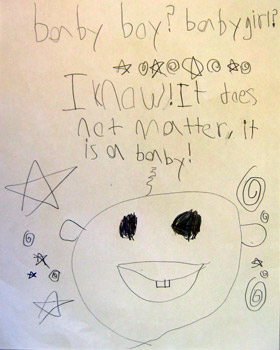My brief legal career is not without its highlights and near misses. I almost took a deposition one time, but the opposing party never showed. I "
third-chaired" (i.e. from a bench at the back of the chambers) a state supreme court appeal to
enjoin construction of Comerica Park and preserve Tiger Stadium. I even stood before a judge when I got sworn in to the state bar.
The only time I actually presented before a judge, however, was when I was still a law student. Through the Women and the Law clinic, I represented a minor seeking judicial bypass to Michigan's
parental consent for abortion law. It was a whirlwind process.
A group of us went with our advisor to the local Planned Parenthood building. Our advisor said we would be paired with a pregnant teen and given 20 minutes to interview her. The interview was our chance to learn a) why the girl felt an abortion was the right option for her, b) why she could not get a parent's written consent to her abortion, and c) her plans to prevent future unwanted pregnancy.
Two teens were seated in the lobby when we got there. A third entered holding her boyfriend's hand soon after. The clinic director walked me to one of the seated girls and said we would be working together. She showed us a conference room and then left. I was alone with this pregnant girl and my yellow legal pad. I couldn't stop thinking with a mixture of saddness and awe, "She has a baby growing inside her."
The girl was fifteen. I didn't know how to begin. Even though she was ten years younger than I, her pregnancy intimidated me. She knew things I didn't. I wanted to ask about those things. Instead I asked why she felt she couldn't get one of her parents to sign an abortion consent form. "My mama would kick me out," she said quietly to the table.
As I'd been instructed to do, I explored this a little bit. "Are you sure? Sometimes your parents are more understanding than you expect. Do you have an aunt or someone you could tell who could help explain things to your mother?" "They'd kill me if they knew I was like this. My sister got thrown out for it."
I tried a different tactic. "Does your father live at home? What about him?" "Don't know," she mumbled. I was confused. "You don't know if he'd sign?" She glanced up at me. I couldn't tell if she was scared or annoyed. "Don't know where he is."
I had no doubts that I was hugely out of my league. I was just a student. And a sheltered one at that.
Finding out her reasons for an abortion was easier. She wasn't speaking to the boy who'd gotten her pregnant; he had a new girlfriend now. She didn't want to get kicked out of her house. She wasn't ready to be a mother. She volunteered that she didn't want to put the baby up for adoption because she thought she might be too sad when it came time to let it go.
I asked what she might do in the future to prevent pregnancies. "Not do it again," she said, like a scolded child. Trying to be realistic without being condescending I asked whether she could think of something else, especially since it can be hard to say "no" in the heat of the moment.
Without any pretense of sincerity she said, "O.K. The pill." I explained that she would need a prescription for the pill, which Planned Parenthood could help her obtain. Then our time was up.
Our advisor then drove us around the corner (how convenient!) to Juvenile Court. Someone from PP had driven the girls over. We reunited outside the judge's chambers and went in as a group.
The things we were to stress to the judge were the reasons the girl wanted an abortion, why a judicial bypass was her only safe route to getting one, and her plans to prevent the situation's recurrance in the future.
My client was called first. She and I went to the desk and stood before
the judge. I nervously presented my client's case and concluded with a request to bypass the parental consent requirement. The judge thanked me. Then she did a wonderful thing.
She addressed herself exclusively to my client. I can't capture the balance of firmness and kindess she used, nor her frank but respectful words. But she said something along the lines of "You have gotten yourself in a bind. That is unfortunate and I am pleased to hear that you have given considerable thought to making sure it does not happen again. I do not want to see you back here in the same situation next month or next year. In coming here today you have shown courage and maturity. You are taking a long view of what is best for you. And for the child you are carrying. I do not like to see young women like yourself pregnant. I do not like sending you off to get an abortion. But I also do not like to see young women throw away their education and their lives with an unwanted pregnancy. You are in control of your body and your future. You have demonstrated that today. I hope you continue to do so. Do you understand me?"
The girl said "yes ma'am."
The judge continued. "I will sign an order permitting you to get an abortion without your parent's consent. You have shown me that you are thinking like an adult in making this decision. I am confident you will continue to act responsibly. Good luck to you."
We thanked the judge and returned to the back of the room. The judge repeated this process with each of the girls, talking to them from her seat of power about their own strength, their own capacity to control their circumstances.
It was a pep talk disguised as legal dicta.
This is the closest I ever got to being the kind of lawyer we see on T.V. My presence in the court, however, was just a courtesy, an excuse for me to get some experience before the judge. The hearing was clearly for the benefit -- on so many levels -- of my client.
I haven't thought of that day in quite a while. I was reminded of it today reading
Dr. Charles's account of a teen birth. It is the other side of the coin, what my client might have experienced if she hadn't gone before the judge. Who is to say which path was better?

















